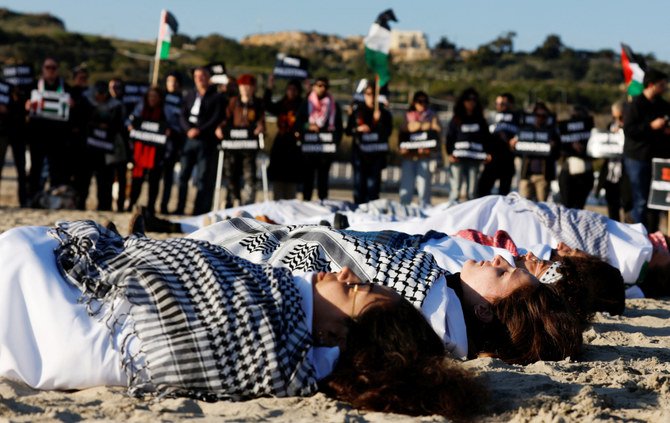- Health Ministry director general Moshe Bar Siman-Tov calculated that out of Israel’s population of 9.7 million people, some 100,000 have been exposed to potentially traumatizing incidents since the start of the war
JERUSALEM: Israel has been plunged into a mental health crisis by the Hamas attacks of Oct. 7, with the population reeling from anxiety and depression and at risk of post-traumatic stress disorder, experts say.
A study published in the Lancet medical journal on Jan. 5 said “all citizens in Israel were, in some fashion, exposed to this attack of unprecedented scope and traumatic impact.”
It reflects a “mass national trauma,” said the study, co-authored by clinical psychologist Yossi Levi-Belz, which looked at PTSD, depression and anxiety rates after the attack and found “a broad and significant impact” on the mental health of Israelis.
The country’s Health Minister, Uriel Buso, meanwhile, has acknowledged a lack of mental health provision that predates the war and will need a “quantum leap” to overcome.
The violence that has so traumatized Israelis began in the early hours of Oct. 7, the last day of the Jewish holiday of Sukkot, when militants from the Palestinian Hamas movement broke through the militarized border with Gaza.
From the day of the attack, calls to Israel’s ERAN Emotional First Aid helpline nearly doubled, its director Shiri Daniels said.
Among those affected were not only the survivors who had suffered unimaginable horrors at first hand, but also the families of the victims and hostages, as well as rescuers and police officers, Daniels said.
Even those not directly impacted were still affected, she said, adding “everyone in Israel identifies with the victims.”
Daniels describes cases of children unable to be left alone by their parents at night, adults unable to concentrate or consumed by guilt at not being able to save their loved ones.
Health Ministry director general Moshe Bar Siman-Tov calculated that out of Israel’s population of 9.7 million people, some 100,000 have been exposed to potentially traumatizing incidents since the start of the war. And around 200,000 have been displaced from their homes by the violence.
Even before the war, Israelis’ mental health was in a poor condition, in particular due to the lingering effects of the coronavirus pandemic.
The World Health Organization estimated that the proportion of Israeli adolescents who regularly complained of feeling low or nervous or having difficulty sleeping had risen from 20 percent in 2019 to 30 percent in 2022, “pointing to a significant rise in mental distress following the pandemic.”
In January, Health Minister Buso said it was “no secret that the issue of mental health was suffering from a huge deficiency” before Oct. 7.
“Now it is necessary to make a significant quantum leap in the field for years to come,” he added.
The increased demand for mental health services comes despite a shortage of qualified professionals.
In response, the Israeli government has announced a recruitment campaign and voted in mid-January to invest an extra 1.4 billion shekels ($380 million) in boosting the mental health system.
However, experts say it is still too soon to accurately gauge what psychological scars the attack has left behind, or to assess the possible treatments needed.
Psychologist Milca Adrey of OneFamily, an association that supports victims of attacks in Israel, said that while not everyone would develop PTSD, Oct. 7 could resurrect previous traumas, including for Holocaust survivors.
One such person was Suzy Sprecher, who survived World War II in hiding in France, who said she was affected by reports of children being detained in mazes of tunnels underground in Gaza.
Source: Arab News



